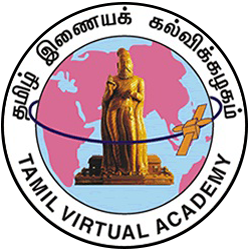Primary tabs
-
D02114 Kalaviyal - I
This lesson speaks of the various aspects of ‘Kalaviyal’. Kalaviyal is the second chapter of the ancient grammar treatise ‘Nambiagaporul’. ‘Kalavu’ signifies the clandestine meeting of lovers before marriage. Kalaviyal is a detailed description and codification of the morality and behaviour displayed by the lovers in the context of kalavu. The concept of kalavu is similar to ‘gandharva’. Both imply love that is born spontaneously when the thalaivan and thalaivi happen to meet each other by chance.
While the first ‘noorpa’ (or verse) of Kalaviyal in ‘Nambiagaporul’ defines kalavu, the second sets down the events that precede kalavu in their sequential order. There are 4 stages or events (‘padinilaigal’) that lead to kalavu. These are ‘kaatchi’ (i.e. when the thalaivan sees the thalaivi for the first time), ‘aiyyam’ (struck by the beauty of the thalaivi, the thalaivan wonders if she is a heavenly being), ‘thunivu’ (the thalaivan realizes that the thalaivi is not a damsel from heaven but a woman of exceptional beauty) and ‘kuripparithal’ (where the thalaivan tries to find out if the thalaivi displays any signs of interest in him). As these 4 events concern only the thalaivan, they are attributed to ‘kaikilai’ which is one-sided love.
The chapter on Kalaviyal also contains a compilation of the codes of conduct (or ozhukkam) associated with kalavu. These are called ‘kilavi thogai’. There are 17 types of kilavi thogai. This lesson deals with the first 7 types of kilavi thogai: i.e. ‘punarchi’, ‘vanpurai’, ‘thelivu’, ‘pirivuzhi magizchi’, ‘pirivuzi kalangal’, ‘idanthalaippaadu’ and ‘paangan kootam’. ‘Punarchi’ signifies the union of lovers who happen to meet by chance. This meeting and union either happen as a result of divine ordinance or with the consent of the thalaivi. ‘Vanpurai’ denotes the thalaivan’s attempts at proving the earnestness of his love and reassuring the thalaivi of his affection for her. ‘Thelivu’ refers to the thalaivi’s acceptance of the thalaivan after he clears her doubts about the sincerity of his love. When the thalaivi departs after her secret assignation and union with the thalaivan, the latter recalls the time they spent together and expresses his happiness. This is called ‘Pirivuzhi Magizhchi’. ‘Pirivuzhi Kalanga
l’ refers to the thalaivan expressing his sorrow on the departure of the thalaivi after their kalavu. ‘Idanthalaippadu’ is the second meeting of the lovers in the place where they first happened to meet by chance. The friend or the companion of the thalaivan plays an important role in bringing the thalaivan and thalaivi together. The help rendered by the thalaivan’s friend in arranging kalavu is called ‘Paangan Kootam’.


